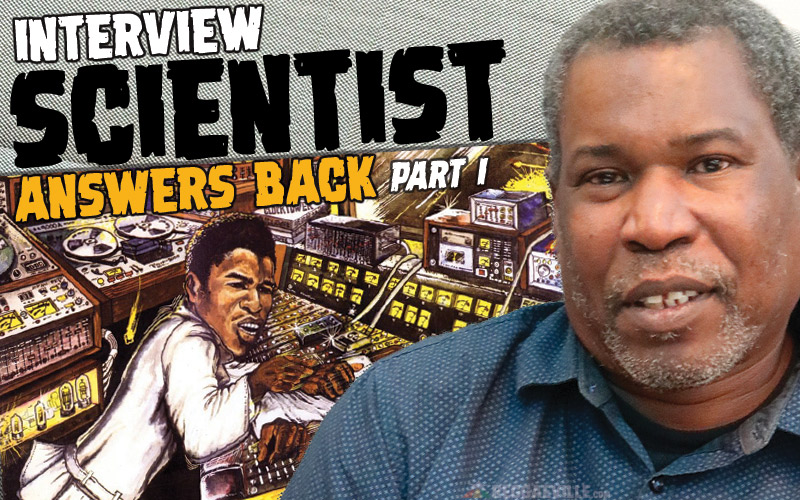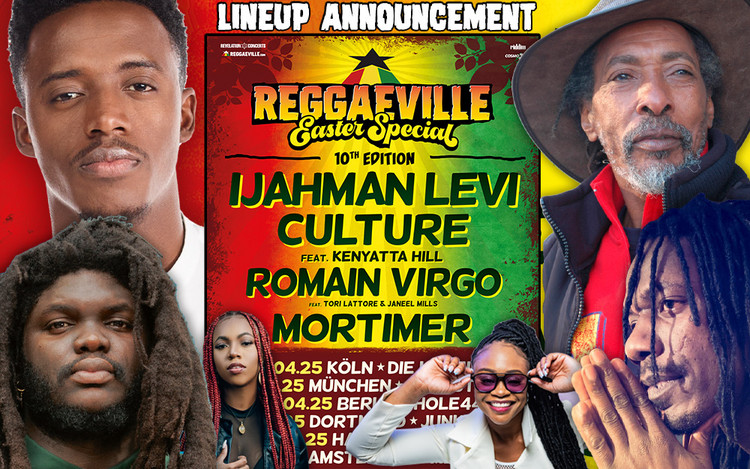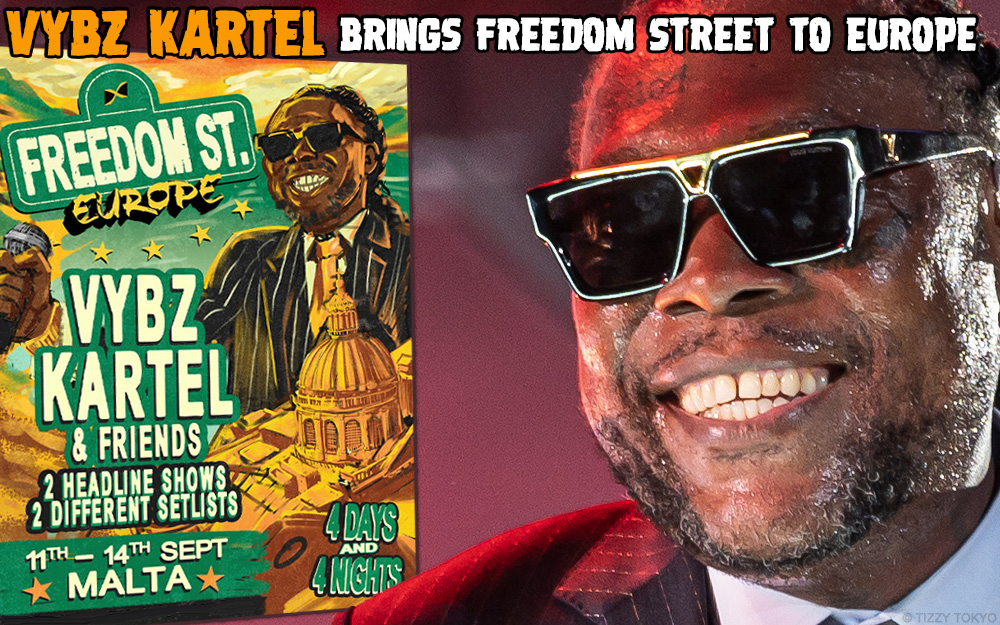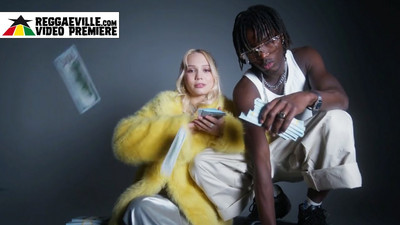Linval Thompson ADD
Interview - Scientist Answers Back (Part I)
11/11/2019 by Angus Taylor

Dub music could be defined crudely as reggae without vocals: or voices reduced to haunting snatches of repurposed phrases. King Tubby, the engineer who first popularised dub in Jamaica in the 1970s, was not known for being vocal. He is typically described as a quiet person who let his studio do the talking.
By contrast, Tubby’s successor Scientist, who rose from winding transformers in the repair shop to become the early 80s dub eminence, is an outspoken, highly opinionated man. Since he left Jamaica for the USA in 1985 (as Tubby studio colleague and rival, King Jammy, embraced the digital dancehall revolution) Scientist has been quick to straighten the record on perceived transgressions or misrepresentations.
Angus Taylor first interviewed Scientist in 2008 for United Reggae magazine. Their explosive transcript, widely read at the time, showed a man in conflict with his former record labels and producers. A dispute with UK imprint Greensleeves over the copyright to his music would eventually lead to his name being removed from the titles of reissues.
Scientist has mellowed somewhat in the decade that followed. He is a familiar face on the Los Angeles reggae scene - and regularly tours Europe (working with Liverpool-based booking agency Positive Vibration). He recently passed through Germany, Israel, Russia and the UK, attracting devoted fans to his live mixing show.
Yet Scientist remains forthright in his convictions. Before the tour he contacted Angus to request a right of reply to two recent Reggaeville interviews where his name was mentioned. One was with singer and producer Linval Thompson [read the interview here] - whose work at Channel One studio, using the Roots Radics, yielded some of Scientist’s best loved mixes. The other was with Studio 1 and Harry J engineer Sylvan Morris [read the interview here].
Angus met Scientist at a remote hotel near Heathrow airport - as he stopped over between LA and Germany. Scientist was hungry and preparing to go out for a meal: you may notice that the metaphors he uses to describe his approach to music increasingly shift from driving towards food!
Scientist has often complained in the past about his interviews being censored - so Angus suggested he stick to facts and avoid insults or anything defamatory. Scientist, showing what a difference a decade makes, agreed, but during this two part discussion, he still had plenty to say.
Although he touches on his experiences with Greensleeves, the main thrust of the interview concerns his contributions to Tubby’s, Studio 1, Channel One and Tuff Gong studios. In Part 2 he shares memories of his friend, the engineer and singer Pat Kelly, who passed away this year...
How have the last 11 years been?
Thank God for life. A lot of people have come and gone. You know we've just lost Pat Kelly.
I’m sorry about that, I know you were close. Is there anything you wanted to talk about in particular?
One of the things I'd like to talk about is there is this misconception that Tubby's taught me. Tubby's didn't teach anybody anything. And about the Fisher reverb. Ok there was a Fisher reverb but I didn't use it because it was very noisy. They are spreading rumours about Fisher reverb. So all this nonsense - I wish we could clear it up what these people have out there. Me as Tubby's apprentice? Tubby's does not give you apprenticeships. You can either do the work or you can't. As I swear to God, he never came into the studio and said “Do this”. Not one time. But there is this big misconception that Tubby's taught me. Tubby's doesn't teach anyone. Not Pat Kelly, not anyone. So he just said “Here is the studio - go to work”? Sink or swim. He gave me a wonderful opportunity. If you want to learn to swim, push you off the boat.
Your father had an electronics background. And as a result you became very interested in electronics. You first went to King Tubby to buy transistors for the amplifiers you were building? What was the first amplifier you ever built? And why did you decide to do that?
To buy parts. Amplifier parts. A 4 KT88. I was about 18 or 19. You know, you're growing up as a kid you're playing with your dad's tools and it became... I don't know... It chose me. I didn't choose it.
How did you start to work at Tubby’s?
I started quizzing his brains and telling him how I'd been listening to the records and I had my own theory of how I think a studio should operate. So I wanted to use that as an opportunity to see how I could get inside his studio to see if my theories were correct. And for sure they weren't far off but what I learnt was that it was not a one-man operation to build a console - especially at that time.

What was your theory?
Just about how it worked, because I read a couple of books and they told me about multitrack recording and I figured out most of it, electronics. But when I went there and actually did it for myself I got a broader understanding of what it was.
Tell me about when you first mixed at Tubby's.
He pretty much made me a bet. Henry Lawes came by and wanted Jammys to mix. Jammys was always late. Never on time. And Tubbys refused to mix with anybody [at that time]. So “The only way you're going to get the record mixed is to make Scientist mix it”. “Oh no, he doesn't know what he's doing” blah blah blah. Actually the first record I mixed was the Maytones. The first record I mixed that got released was Junjo Lawes but I had done mixes for Maytones before that.
For which producer?
It was Maytones as far as I remember that was the producer. I don't remember the song but the Maytones was actually the first.
But Barrington Levy Collie Weed was the first tune that was released.
That was released.
And that was a hit?
Yeah, on my way to Marverly. Collie Weed.

So when you joined Tubby, Jammy was the engineer and sometimes Pat Kelly?
Pat Kelly used to work with Bunny Lee at night-time as the engineer mixing Bunny Lee's songs. Pat Kelly would mix the A-side and then I would mix the B-side. But Tubbys and Jammys were never on the same page because he was very unreliable.
Didn’t he go off to Canada for a while?
Yeah he went off to Canada and then got himself in trouble.
What about your relationship with Pat Kelly? You seem to have a good relationship with him.
I had a good relationship with Pat. From day one. Never had a hard word or any problems with him.
Would you say he encouraged you?
Of course because he had every opportunity when Bunny Lee was mixing at night-time to deny me to mix the version but he always gladly got up and said “Mix the dub”.
And this was after the production for Junjo that you mixed?
Yeah because Tubbys would be gone. From 6 o'clock in the evening you don't catch Tubbys at the studio. So Bunny Lee would only come in at 7, 8, 9, 10. Tubbys was never there. Tubbys would come to the studio from say 2, spend about 2 hours and then he's gone.
So did Tubby's do any mixing at all at this point?
When I was there the last time I saw him mix was Barber Saloon with Mikey Dread.
And why did he stop?
What I got to find out was that it was the same kind of issue I had - people kept compiling all these songs and making dub albums out of them and not compensating him for it. And then he had other things to do and he didn't like the smoking and a lot of the stuff that he had to deal with when he worked with some of these characters - so he didn't want to do it. I only saw him mixing in that studio about two times and it was only for selected persons. Carlton Patterson. Remember when he had the Black and White label going on? If you look at the discography you can see that Tubbys, yes, he did mix a bunch of tracks with Bunny Lee and all of that but as the discography shows, the last of the selection was Black and White label with Carlton Patterson. And then I came in when it was Rainy Night in Georgia that was going on with Bunny Lee and all that Johnny Clarke stuff. That's when I came in. So after that song Tubbys mixed, Barber Saloon, I swear to God I never saw Tubbys in the studio mixing anything after that.
And you got the name “Scientist” because you predicted the automated fader console...
I predicted a lot of things that sounded crazy at that time. Moving faders, these unlimited tracks that you see we have, and I developed my own way of how to do things. Because the norm for other people, for a lot of people didn't sound good to my ears. I had to develop my own way of how to record drums and how to do drum and bass - pretty much my way of doing things.

What was not sounding good to your ears at that time?
At first when you listen to Studio 1 records, of course great musical composition, but as I got to develop the experience I said “Ok, the reason why the kick drum sounds like that is because it's only one mic” and then I worked at Studio 1. So I said “Ok, the reason why the song sounded like that that was because they just took the mic and threw it inside the drum, no proper positioning, and as a result it came out like that." But the musical composition is unbeatable until now. The best musical composition but the worst sound recordings.
(Laughs)
And then another thing I want to get into is that nonsense, verbal nonsense that Morris was talking about.
Where he said he had to show you how to get the right sound when you visited Harry J from Channel One?
I'm the one who was teaching Tubbys and all of them in the long run. If you get into a random car that you didn't go to before, you need to know “Ok, where is the light switch, how do you adjust the seats?” and if not, you can't drive. If you cook in my kitchen and you don't know where the pots are, it's not that you can't cook. You just need to know where the pots are. I read what he said “It was a disaster” - no, they carried me up there because the sound quality that was coming from there was very poor. Like when Bunny Lee went there to bring a song to mix, the worst sound quality.
We're talking about the sound at Harry J?
Yeah. When stuff came from Channel One it sounded nice and tight. And that's why he started to talk about “Channel One sound inside Channel One” because he was not mic-ing the drums the proper way. So nobody was saying “Come and take over because it's a disaster” nothing like that.
So you just needed to know where things were?
Yeah like “Where is the microphone?” “Where is the patch bay for the microphone?” It was not a disaster. You give a racing car driver my car to drive, he's going to need to know “This is how we adjust the seat and this is where you turn the light on.'' Not like he can't drive - he's a racing car driver. (laughs)
So when you listen to this classic Studio 1 productions that Morris engineered, you don't like the sound?
He did very good for what he had to work with at that time. But as you know when you listen, you don't hear nice tight drums because they only had one microphone on the drums picking up the bass, everything. And he wasn't mic-ing the guitar direct and it was a whole bunch of stuff. Great musical composition. He got a very good sound for what he had to work with on two-track.
How do you rate Sid Bucknor as an engineer?
Everybody did their thing. He recorded some great tracks. But again I was the youngest one who came in, I could hear all these guys’ mistakes. And even when I listen to some of the Channel One stuff I hear some of my mistakes. And then if you know the history of Channel One and the music like Woman Like Shadow and stuff, you can really hear where the sound was evolving and getting better because I was listening to my own mistakes. And then I'd find out how to make them perfect.
Jumping back to Studio 1, is it right that you started moving from Tubby's to go to Studio 1 because you wanted to learn about live recording?
I was in between Studio 1 and King Tubbys at that point because I wanted a broader knowledge. And Mr. Dodd wasn't too happy about that because he thought, he was a superstitious guy, that I was trying to spy on him.
He thought you came from Tubbys to spy on him?
To spy on him. And then what we discovered was some very poorly maintained tape machines. The heads dirty, out of line and that's why the music ended up with that low quality - part of the reason.
Tell me about the changes you made at Studio 1 when you were there...
I started learning how to mic the drums. So for example Willie Williams, Michigan and Smiley, you can absolutely hear the difference. Because I started to do things differently. Mr. Dodd had a problem with it at first because he was an older man, a much older man than me who brought me into his own ways. He had been making records since before I was born - so how is it this young guy is coming inside telling somebody how the recording should sound when he’s been doing it before when I was born? But when the musicians started to say “No Mr. Dodd, it sounds better”, then he started to ease up a bit.
These musicians - was that Freddie McGregor on the drums?
Freddie played a lot of drums. It was Bagga Walker, Pablove Black...
12 Tribes musicians...
Yeah yeah yeah yeah yeah. What was his name Devon? Devon Russell? Bum-Ball.
So because you were having this tension with Mr. Dodd you started spending more time back at Tubbys?
Yes, because he just wanted to be stuck in this one way. The machines were poorly aligned and if you're a race car driver and somebody is giving you a defective car to drive, you wouldn't want to drive the car right? Because you know better. So I couldn't deal with it. I couldn't deal with this person who was stuck in this one way, believing everybody was out to get him. The progress was limited. And he was supposed to have the volume in the control room at a certain volume so you don't overdrive the console and for him it was turned down so low so that you could barely hear it and he thought that was ok. If you turned it up at a reasonable rate when people are playing music, he had it turned down. And telling you “You must mix like that, you can't mix like that”. Because how are you going to know what it sounds like when it's turned up loud if you don't already hear it like that? So he had these things about him that I didn't agree with him about.
Did anyone bully you when you worked in Tubby’s studio as a young man?
Yeah of course. Junjo Lawes. And that's when I stopped working with him. My cousin Clive who lives here, he started telling me about all these different albums that Greensleeves was putting out. I started saying “Tubbys I don't want to work with these guys here because they're bringing bad man gun man business to me and I don't want to deal with it”.
You said at first people didn't want to use you and you had to prove yourself. Was it tough at the beginning?
Yeah yeah yeah. You're this young kid, everybody is way older than me doing it, so I look like I should be in school. If you have your car and something is wrong with it, then not to put down the young person but you might want somebody with more experience. And I understand all of that. And then worse if they're coming in doing something completely different, unorthodox, of course you're going to have some kind of a doubt. All that is reasonable. But then it was after this hit with Barrington Levy and everybody heard it, then after that everybody wanted to ride on the same bandwagon.

Let's talk a bit more about Junjo. Linval Thompson has said that Junjo was his bodyguard before becoming a producer...
Kind of, sort of. I never quite heard it heard that way but if Linval said he was his bodyguard I could see some linkage to it.
So you worked with Junjo first before Linval but you decided you didn't want to work so much with Junjo...
I didn't want to work with him at all. And then he used to send Jah Life to the studio. Because I where everybody knows that you are a gunnist. And everybody knows you are this general.
Did you work at all with Roots Radics at that point?
No, not at that point because Tubbys was a place where you could only do voicing and mixing. So the songs would come from Channel One with Roots Radics playing on it and then I would just mix them at that point - until I started at Channel One.
Why did you decide to go to Channel One?
Well, again for experience. I wanted to learn how to record. And when the songs were coming in after a while, mixing songs, I thought “Oh you know what? The drums could sound like this, the bass could sound like that” and then the only way was to leave from where I was, at Tubbys, to Channel One to develop that experience.
They already had a lot of engineers there at Channel One. Was it difficult to get started there? I heard that Channel One thought you were a spy as well?
Yeah yeah, all of these people had their superstitions. Like I heard Morris talking about how these Chinese were coming up to Harry J - to learn what? It was the worst sounding studio in Jamaica. We weren't going to learn anything. I don't believe that. That part was a nonsense. But yeah “I hear how he's a spy because I hear Tubbys building a studio”. But what if that had happened? Because everyone believed the studio made itself sound like that. Because what happened is pretty much is that everybody at Channel One and tried to fool everybody saying “It's the API” - it's everything but me!
Tell me about the changes you made at Channel One?
Different way how to set up the drums. Every day I had a different course for them that they didn't know which way to follow. One of these rules was when you finish work you must break down everything and put it back. But they found that by me not putting back everything and resetting the board it left a footprint for everybody else to follow. “Oh no no no no no! Don't reset it! We’ll take care of it!” So the next morning Souljie or whoever would come “Ok, this is how we EQ the hi-hat” so it looks like them. Then what JoJo would do was he only had a certain set of instruments and microphones that he used only on his sessions and then he started leaving them out because I refused to work with the nonsense stuff. And everybody started to believe that “Oh he leaves out the special mic and this is why the studio sounded good”. Nonsense! So how come when other people use it it they can't get the same results? I've been through all of that with these people.
So was JoJo Hookim the one that saw the potential in you at Channel One?
Well yes because to be fair, JoJo was the one when everybody said “No we want Souljie, he is experimenting” JoJo heard the difference. Because the first song I did with JoJo was M16 with Lone Ranger, so right when he heard that I saw the kick in his head. And then after that now “Ok, ok well JoJo is using him so he must be good” and they just wanted to ride the bandwagon. You see this music business? Most people don't know anything for themselves, so they always have to watch what the other person does and they jump on the bandwagon. One person makes one successful song and but then it's 50 different versions of the same song coming now because most of them don't have any ideas for themselves.
So where was it that you met Linval? Was it at Tubbys?
I met him at Tubbys.
Because he said he spent a bit of time there...
No, not really. That's the next misconception I want to clear up. He used to have this guy named Saddle. Saddle used to come for Linval and then JoJo's half-brother. But both of them were rarely on any of those sessions. Linval used to send Saddle to the studio and get these songs mixed. And Saddle would come with the tapes and I would mix it and voice Barrington Levy, but they were barely there.
So did you start to work with Linval more at Channel One?
Yes. It was mostly like just another session because the way I had the studio sounding with Linval, Junjo all of them, it was unbeatable until now. So they used to just come basically, part of the nonsense with this guy, “Written and arranged by…” why when he was sitting at the back of the room or sometimes not showing up to the studio? And then on top of that not paying the musicians, barely paying for the studio time and having everybody else doing the work. Of course yeah, give them credit they did organise the session and are responsible for getting the people so their rightful role was “executive producer”.
In our recent interview, Linval said that he was the one that asked for that big drum and bass sound because he had been to England and he knew the English market...
Nonsense. So why is he not asking for that sound elsewhere? Why do his records now sound like somebody playing a fyfe? Why does he not ask for any more? That's nonsense. You see what makes sense? Look here, if you're making my lemonade, you put two teaspoons or four teaspoons of sugar in the water with five lime. It doesn't matter if I do it or he does it or anybody - yet they don't come out the same. So why is he not telling anybody else to do it? That's nonsense.

Did you go to England at all?
No.
Why didn't you go to England?
Lloydie Coxsone tried to get me here the first time you know? And I am sorry that I didn't go but I was discouraged by by JoJo. Because if I left then everybody would suddenly realise when I left that it was I doing the work. So some people used strategy “Ok, he's a good workman, keep him down, don't make him know how important he is.'' Saying “Don't go. It's pure problems doing live sound” because at the time what Lloydie Coxsone really wanted was for me to do live, the time and the technology wasn't quite there as yet to do that.
When did you first hear dub music from England? Things like Mad Professor, Dennis Bovell?
Back in the 70s in Jamaica. Late 70s.
What kind of things were you hearing and what did you think of it?
It was a compliment. I heard people trying to emulate what we are doing which is the next compliment. OK they did that, it is one way of doing it but it's still not quite right (laughs) but it developed its own sound, developed its own unique sound. Ok then it goes, other people like it, because I get to learn that sometimes I don't have to like a song - it's what other people like. Ok you like it but if I mixed songs and I hear it now, I still don't like it but 20 other people like it. Ok let me just separate myself from what I don't like and what other people like.









